Intel X25-M SSD: Intel Delivers One of the World's Fastest Drives
by Anand Lal Shimpi on September 8, 2008 4:00 PM EST- Posted in
- Storage
Real World Performance with PCMark Vantage
Next up is PCMark Vantage, another system-wide performance suite. I chose to run the whole suite rather than just the HDD test to hopefully better characterize real world performance of these drives.
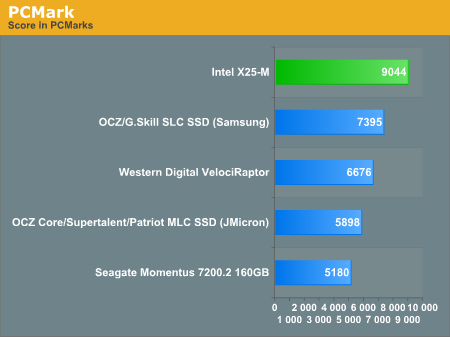
If we look at the individual test subsets of PCMark Vantage we can see the drive's strengths at work.
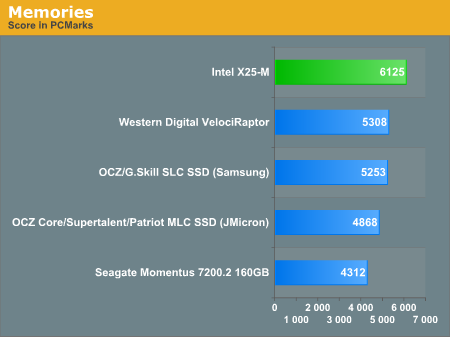
The memories suite for example includes a test involving importing pictures into Windows Photo Gallery and editing them, a fairly benign task that easily falls into the category of being very influenced by disk performance. The end result is a 15% performance advantage over the VelociRaptor, a 16.6% advantage over the Samsung SLC based SSDs and a 42% advantage over the 2.5" Seagate Momentus 7200.2 HDD - the X25-M is great for a desktop, but a miracle for a notebook.
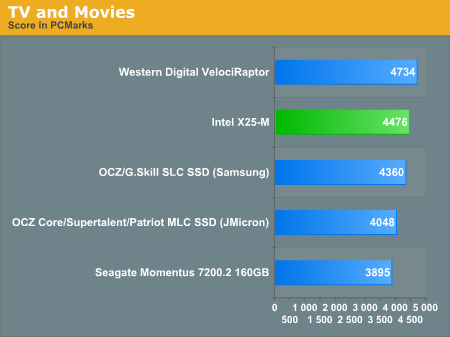
The TV and Movies suite shows that the X25-M won't always dominate. Here the tests are focused on video transcoding which is mostly CPU bound, but one of the tests involves Windows Media Center which tends to be disk bound. Despite the nature of the test, the X25-M competes at the top of the chart but is bested by the VelociRaptor. It's performance isn't bad, but not earth shattering. Again, compared to other notebook drives it is a dream come true.
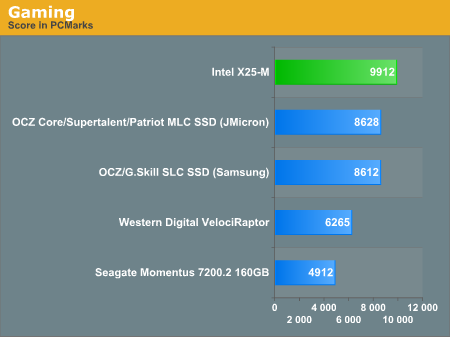
The gaming tests are very well suited to SSDs since they spend a good portion of their time focusing on reading textures and loading level data. All of the SSDs dominate here, but as you'll see later on in my gaming tests the benefits of an SSD really vary depend on the game. Take these results as a best case scenario of what can happen, not the norm. You can also see how tempting it is to opt for one of those JMicron based MLC SSDs, they perform quite well here - the test simply doesn't show the ugly side of living with them.
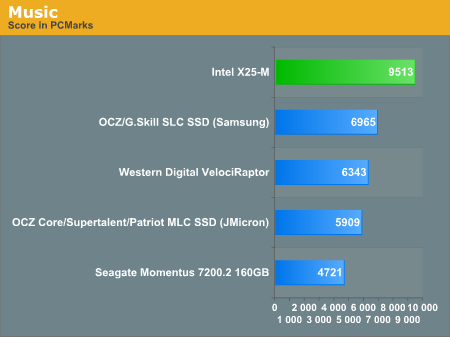
We're back to utter domination in the Vantage Music test. Here the main test is a multitasking scenario, which SSDs do quite well in: the test simulates surfing the web in IE7, transcoding an audio file and adding music to Windows Media Player (the most disk intensive portion of the test). The X25-M is nearly 60% faster than the VelociRaptor, around twice the speed of the Seagate Momentus 7200.2 and over 37% faster than the Samsung SLC based SSDs. When the X25-M is fast, it's very fast.
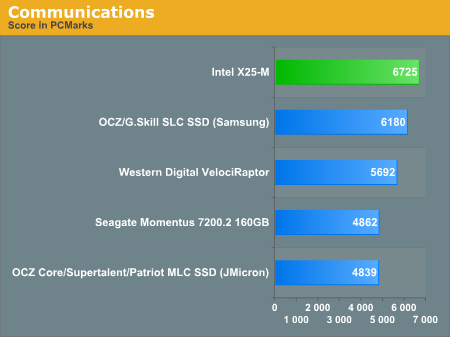
The Communications suite is made up of two tests, both involving light multitasking. The first test simulates data encryption/decryption while running message rules in Windows Mail. The second test simulates web surfing (including opening/closing tabs) in IE7, data decryption and running Windows Defender.
Despite the inclusion of Windows Defender, the X25-M's advantage over the VelociRaptor is only 18%. I would honestly expect more based on some of my other system scanning tests, but I believe the reason we're seeing general domination and not utter destruction is that the tasks being run alongside Windows Defender are quite light on the disk. Yes, I am nitpicking an 18% victory - this drive is that good. The SLC drives do well here but are no match for the X25-M. It's in tests like this that the X25-M really earns its keep, it delivers SLC performance at a much lower cost.
The Productivity test is awesome, let me explain:

In this test there are four tasks going on at once, searching through Windows contacts, searching through Windows Mail, browsing multiple webpages in IE7 and loading applications. This is as real world of a scenario as you get and it happens to be representative of one of the most frustrating HDD usage models - trying to do multiple things at once. There's nothing more annoying than trying to launch a simple application while you're doing other things in the background and have the load take seemingly forever.
Note that the test itself isn't very write intensive, so even the JMF602 based MLC drives do well here. I can attest to this as one of the things that drove me to put a SSD in my desktop was that I wanted my applications to pop up instantaneously, regardless of what I was doing. The pausing doesn't get a chance to rear its head, so all of the SSDs rule the playing field here. The X25-M delivers 2x the performance of the VelociRaptor here and is faster than every other drive. Enough said.










96 Comments
View All Comments
bharatwaja - Tuesday, September 9, 2008 - link
This is by far the best article I have ever read about SSDs... Anand you ROCK!!! and EVERYONE at ANANDTECH ROCKS!....Great article... Thank you........ you just saved me from spending $99 on a pretty much useless SSD.
[Takes a printout of Anand to worship]
hyperdoggy - Tuesday, September 9, 2008 - link
I noticed that ocz have released core v2 series of their ssd. It seems to come in a different size configurations than its 1st gen product, can you confirm if this is based on the same controller as its 1st gen product Anand?Also, i would love to see some ssd raid action since ssd does not lose its data when the array fails. I'm more interested to see if there is other limiting factor when you raid with such fast ssds, such as the motherboard chipset itself. If raiding two of those cheap $99 core 32gig ssd helps to reduce the write bug, it might be worthwhile buy, which was something i was thinking of doing till i read the review here.
And might i say, great review indeed Aanad.
bytekeeper - Tuesday, September 9, 2008 - link
Hi there. There is a discussion in the OCZ support forum aboutthe test results published in this article and the OCZ support
staff is thinking that you've got a faulty drive. Check here:
http://www.ocztechnologyforum.com/forum/showthread...">http://www.ocztechnologyforum.com/forum/showthread...
Is there any chance you can re run the test with another
Core drive or Supertalent/Patriot JMicron JMF602 victims?
Thanks.
Gary Key - Wednesday, September 10, 2008 - link
I posted results with a newly arrived Core drive straight off the shelf from Newegg in that thread. No changes to our initial results, although I will try a different controller later this week.Anand Lal Shimpi - Tuesday, September 9, 2008 - link
In total I have four drives based on the JMF602 controller: one from OCZ, SuperTalent, Patriot and Silicon Power.Of the drives, the OCZ Core is the oldest. If you look at page 9 in the article I've got a table that has the SuperTalent, Silicon Power and OCZ Core drives in it. The Silicon Power and SuperTalent drive both perform worse than the OCZ.
The situation gets more interesting if you look at the Iometer results for the drives, which I didn't publish in great depth but I did run internally. Average write latency goes down tremendously on the SuperTalent drive, but max latency more than doubled. I suspect that the SuperTalent drive may use a newer version of the JMF602, but the result is a reduction in real world performance - at least in the test cases I ran.
The inability to complete an OS install also applies to other drives. As I mentioned in the article I had the same problem with the SuperTalent MLC drive in OS X.
While there are undoubtedly ways of attempting to lessen the impact of the JMF602's poor design, I believe only a new controller will actually completely address these problems.
Take care,
Anand
yottabit - Tuesday, September 9, 2008 - link
This is why I love your website. Lots of your articles are so in-depth they make me think I'm reading some grad school journal that I should be paying money for.I actually first saw the Intel SSD article on TomsHardware, but didn't even bother to read it because I imagined it was going to say something like "OMG INTEL SSD ROX LOLZ SO MUCH FASTER THAN OTHER HDS"
I come here expecting to get a detailed analaysis, and that's always what you provide! Thank you so much.
My only gripe is you seem to have skipped a very basic test- dragging and dropping large files! You combine extracting files with other tests but you don't have any basic drag + drop tests I saw.
This rocks for the computer industry though. I personally couldn't believe so many people were buying the existing SSDs. This new Intel stuff looks like something that would actually make an improvement without compromises. I could certainly live with the capacity, I'm still running a 36GB raptor for my boot drive. Hah.
Dariusbird - Tuesday, September 9, 2008 - link
I'm proud to be working for the company producing these IC's. Nice work on the article.therealnickdanger - Tuesday, September 9, 2008 - link
It would be very nice to see where on all these charts the best 5400RPM 2.5" SATA drive would sit. Most laptop users have 5400RPM drives, so this would be MOST EXCELLENT to see the benefits of all these drives in comparison - especially the now "crappy" JM-based MLC drives.johncl - Tuesday, September 9, 2008 - link
I must congratulate Intel for adressing the issues with MLC and creating a brilliant product. Also thanks to the author of this article to point to the problem of MLC that seems to go by unnoticed by so many benchmark review sites.The initial price from intel is suggested retail price so I guess in a short while this should come down a bit, as its a bit over the top. As the author says, at around $400 this is a no-brainer for an enthusiast considering the improvement you will experience on your system. This is for me the most important advancement in computer technology in the last years and we are just starting to see the advantages of it. Besides the person sitting behind the keyboard, the slowest thing in your computer is the harddisk. You can swap CPUs and GPUs to your hearts desire, but eventually, percieved performance of a computer often boils down to how fast you get data in and out of system memory. SSDs will fix this technological void we have had for all these years with mechanical disks.
In general its about time we get rid of all mechanical parts in a computer, including fans. We need good cooling solutions built into our systems that rely on other means than rotating motors. If it means to stop the CPU speed race, then by all means do that, lets try to get todays performance but passively cooled. The SSD will walk hand in hand with this new trend in computing so we can get truly silent workstations. Amen to SSDs!
Gastrian - Tuesday, September 9, 2008 - link
I'm looking into creating a small multimedia PC where by I'll be archiving all my DVDs to DivX and running them through the PC instead of a DVD Player.Would I see any benefits in performance and acoustics (I don't want any noise from the PC interfering with my viewing) by having the OS on the Intel MLC SSD while storing the movies on a mechanical HDD?
Essentially I want to be able to sit down and browse my movies then pick one and watch it without having to worry about loading/transfer times and noise levels.